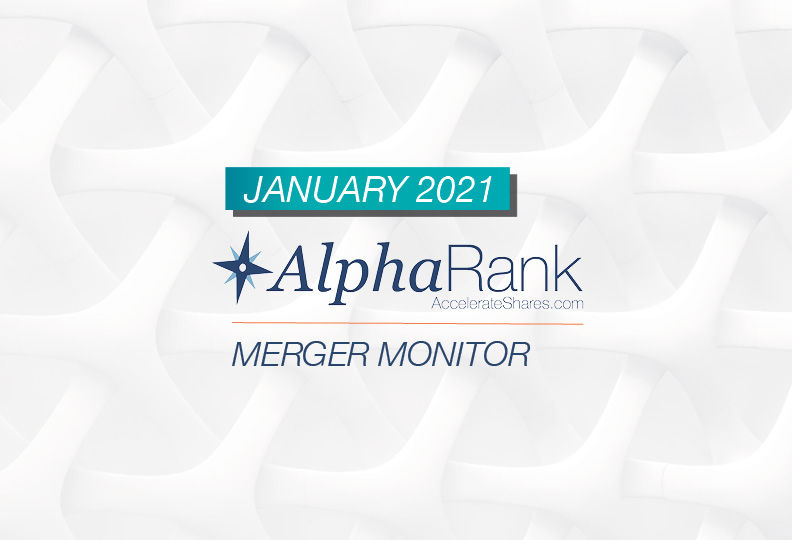February 1, 2021 – The current zeitgeist of Wallstreetbets retail traders versus hedge funds is roiling Wall Street.
A large contingent of individual investors, organizing on the popular message board website Reddit, have conspired to push up the prices of heavily shorted stocks, squeezing long-short hedge funds in the process.
This short squeeze dynamic has had far-reaching effects. Some hedge funds whose short positions have suffered at the “diamond hands” of Wallstreetbets speculators have been forced to cover their short positions and endure massive losses. These hedge funds were forced to “de-gross”, meaning also unwinding long positions and other strategies paired with their shorts, leading to declines in securities unrelated to the short squeeze campaign.
Merger arbitrage spreads have been affected by the de-grossing of large hedge funds, who have been unwinding merger bets looking to lower risk given losses taken in their long-short equity books.
Merger arbitrage yields started the year around 7% and have moved up to 10% due to hedge fund deleveraging. This increase in arbitrage spreads is not due to the escalation of risk in the market. Therefore, opportunistic investors can capitalize on higher potential returns without a commensurate increase in risk.
Last month’s Merger Monitor decried the “past ten announced mergers offer an average yield of just 2.2%,” yearning for the good ol’ days when merger arbitrage offered attractive risk-adjusted returns.
As a result of the Wallstreetbets vs. hedge funds war being waged, things are looking up in merger arbitrage. The past ten announced M&A deals offer an average yield of 4.3%. While these returns are nothing to write home about, they present a decent opportunity set in a zero interest rate environment where seemingly everything is overvalued.
In January, only 11 M&A transactions were announced, representing a total deal value of $44.5 billion. In contrast, there were $158.4 billion of deals across 21 transactions in December 2020.
Over the past month, there were a couple of notable mergers announced:
- UnitedHealth’s $13.0 billion merger with Change Healthcare at a 41.2% premium
- Teledyne’s $8.0 billion acquisition of FLIR Systems at a 28.1% premium
In a bid for “2021 M&A Event of the Year”, Cisco was forced to renegotiate its acquisition of Acacia, during which Acacia’s board of directors masterfully negotiated a stunning 64.3% increase in the price Cisco was to pay for the acquisition. Steadfast arbitrageurs who maintained their Acacia positions were richly rewarded after Cisco bumped its bid from $70.00 per share to $115.00. Thankfully, Acacia was the largest position in the Accelerate Arbitrage Fund (TSX: ARB).
The below AlphaRank Merger Monitor represents Accelerate’s proprietary analytics database on all announced liquid U.S. mergers. The AlphaRank Merger Arbitrage Effective Yield represents the average annualized return of all outstanding merger arbitrage spreads and is typically viewed as an alternative to fixed income yield.


Each individual merger is assigned a risk rating:
- AA – a merger arbitrage rated ‘AA’ has the highest rating assigned by AlphaRank. The merger has the highest probability of closing.
- A – a merger arbitrage rated ‘A’ differs from the highest-rated mergers only by a small degree. The merger has a very high probability of closing.
- BBB – a merger arbitrage rated ‘BBB’ is of investment grade and has a high probability of closing.
- BB – a merger arbitrage rated ‘BB’ is somewhat speculative in nature and has a greater than 90% probability of closing.
- B – a merger arbitrage rated ‘B’ is speculative in nature and has a greater than 85% probability of closing.
- CCC – a merger arbitrage rated ‘CCC’ is very speculative in nature. The merger is subject to certain conditions that may not be satisfied.
- NR – a merger rated NR is trading either at a premium to the implied consideration or a discount to the unaffected price.
The AlphaRank merger analytics database is utilized in running the Accelerate Arbitrage Fund (TSX: ARB), which may have positions in some of the securities mentioned.
* AlphaRank is exclusively produced by Accelerate Financial Technologies Inc. (“Accelerate”). Visit AccelerateShares.com for more information. Disclaimer: This research does not constitute investment, legal or tax advice. Data provided in this research should not be viewed as a recommendation or solicitation of an offer to buy or sell any securities or investment strategies. The information in this research is based on current market conditions and may fluctuate and change in the future. No representation or warranty, expressed or implied, is made on behalf of Accelerate as to the accuracy or completeness of the information contained herein. Accelerate does not accept any liability for any direct, indirect or consequential loss or damage suffered by any person as a result of relying on all or any part of this research and any liability is expressly disclaimed. Accelerate may have positions in securities mentioned. Past performance is not indicative of future results.



